LOUISVILLE, Ky.—As this city climbed out of the 2008 Great Recession, KentuckianaWorks, its regional workforce-development agency, took a new approach to training employees for local businesses: It started teaching people specific skills and awarding them credentials showing that they were superior candidates for entry-level work.
These programs do more than coach the jobless on the soft skills of job hunting and interviewing. People who stick with the training earn valuable certifications that give employers confidence in new hires and cut their training time.
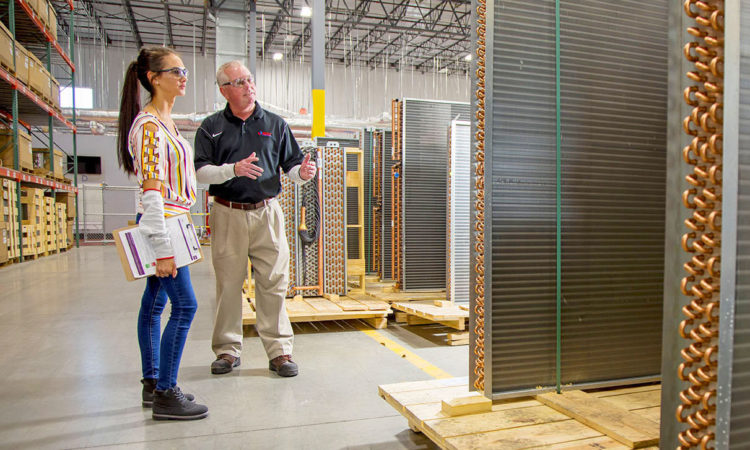
Its education programs in construction, manufacturing, and software development have paid off for students with higher wages in growing fields and a better shot at advancement. At the same time, employers now tap a new pool of prospective employees who arrive for job interviews with solid qualifications and a demonstrated work ethic.
This strategy to promote economic success one potential worker at a time is scoring noteworthy successes. In the year that ended June 30:
- One hundred seventeen people were placed in computer-programming jobs through Code Louisville at annual salaries averaging more than $45,000.
- Seventy-eight were placed in jobs through Kentuckiana Builds, the construction program, at an average wage of more than $15 an hour.
- Students earned 618 certificates through the agency’s manufacturing program.
The education program in manufacturing began in 2013, when KentuckianaWorks established the Kentucky Manufacturing Career Center. As KentuckianaWorks Executive Director Michael Gritton describes it, the need for such training became urgent when Louisville got unexpected good news early in the economic recovery.
First, Ford Motor Co. remained a strong employer.

“Louisville was lucky, because in the teeth of the recession, we were threatened with the loss of one of our two Ford plants,” Gritton said. “Instead, Ford decided to keep it.” He said the company spent almost $1 billion to improve production at the plant.
About the same time, when General Electric was trying to sell the GE Appliance factory here, the company invested hundreds of millions in the plant to make it more attractive to prospective buyers who could restore production that had been moved to other countries.
“All of the sudden, every supplier that had been expecting potential layoffs and closures started realizing that they needed to try to find people,” Gritton said.
As the local and national economies continued to recover and create jobs, Gritton’s agency launched the Kentucky Manufacturing Career Center, which opened in May 2013.
Area job creation is robust. In fact, unemployment in Louisville was just 3.8 percent in August 2019. That’s about half the unemployment rate that plagued the area when the career center opened, and it’s well below what economists consider “full employment.” But people are still coming to the program and still finding jobs through it—sometimes the best jobs they’ve ever had.

That’s the case with 27-year-old Kassie Evans. Evans has worked since she was 16, including jobs at UPS, where she helped track and route packages, and GE Appliances, where she built dishwashers. Late in 2018, after losing her job at GE Appliances, she went through the three-week program at the career center. She learned to drive a forklift and use measuring tools. She earned certification in OSHA safety standards. She became a certified production technician.
It was inconvenient for her to arrange child care for her 3-year-old son, but she’s glad she did. She found the classes helpful, even motivating.
“Every time you came in every morning, everyone was extremely upbeat and positive and happy, and it just really kind of motivated you to keep going and finish the program,” she said.
In December 2018, she was hired as a receptionist at KCC Manufacturing. It didn’t take her long to move onto the factory floor at that company, which builds custom mounts and adapters for large rooftop heating and cooling units. Three months after she started at KCC, she was promoted to a new role as a junior buyer, tracking and ordering parts. Her promotion boosted her pay to $19.25 an hour, up from $15.83 at GE Appliances. It lifted her above a subsistence wage.
Just as important, her new job has lifted her into a work environment she loves.
“It’s totally a little family at work, everyone from the warehouse workers up to the president,” she said. “They’re all just so positive and always wanting to help, and they’re understanding. … I’ve never been in a job before where I look forward to coming in every day.”
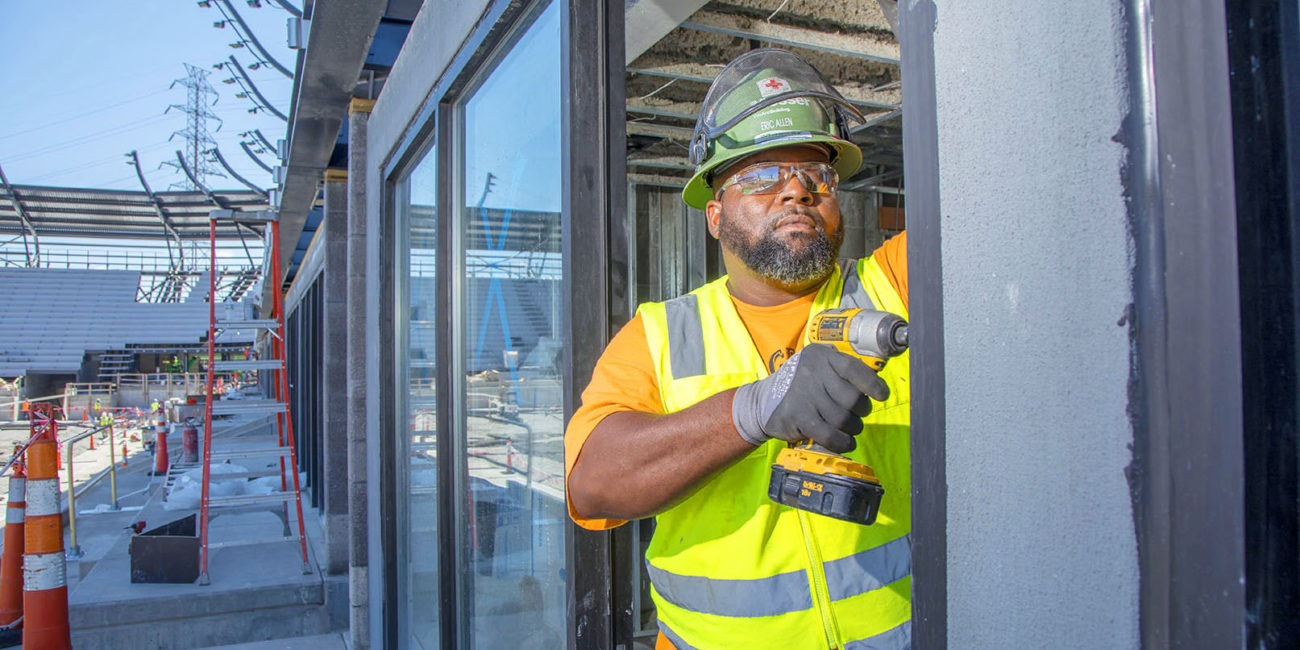
LEARNING TO BUILD… A LIFE
The education program in construction, Kentuckiana Builds, is a six-week program with goals and credentials similar to those in the manufacturing program. It didn’t start until 2017, in response to growing demand for workers in the construction business. Students who enroll in Kentuckiana Builds are certified in OSHA safety standards and basic construction skills such as using tools and reading blueprints.
The Louisville Urban League administers Kentuckiana Builds. League President and CEO Sadiqa Reynolds said she saw great opportunity in the program because she had noticed so few men or women of color at work on construction sites around the city. She is convinced that Kentuckiana Builds can change that—and early signs are promising. The League has attracted many nonwhite students to the program. In fact, a large majority of those who have completed it are black.
One of the biggest obstacles the program faced was getting construction firms to see the potential in program graduates, Reynolds said. The rigorous demands of the construction course helped her make that case.
PROOF OF COMMITMENT
“No. 1, you’ve got somebody who’s shown up on time, ready to learn, ready to work, for six weeks. They’ve come in every day with no stipend. … You have people who in some cases have had to give up jobs in order to be able to take the training,” Reynolds said.
Mike Ferguson, regional labor manager for Messer Construction, is a believer, thanks to his experience with students who’ve earned credentials through Kentuckiana Builds. His firm has hired 30 or so graduates of the program.
“The Kentuckiana Builds program really kind of tied into what we are doing,” he said. It tied in closely enough that Messer considers Kentuckiana Builds a pre-apprenticeship program.
“Every craft worker who comes to work for us has to have the OSHA 10-hour certification and safety training, so Kentuckiana Builds covers that,” Ferguson said. “The curriculum they use for their introductory program is the NCCER, the National Center for Construction Education and Research. All of our training programs—our labor, our carpentry, the regional trainings that we do, our craft-leadership programs—all of that is based on the NCCER curriculum.”
One of Ferguson’s hires from Kentuckiana Builds is 43-year-old Eric Allen. Allen, who was hired in 2018, is in the second year of an apprenticeship program as a general laborer.
Allen had worked some less-skilled construction jobs, ones that didn’t require the depth of knowledge he has now. He worked in residential construction for a time, and he installed countertops in another job.
“There was a lot of new information” in the Kentuckiana Builds program, Allen said.
As a man who was in his 30s during the Great Recession, Allen is accustomed to hedging his employment bets. He’s worked in several manufacturing businesses, and he even obtained a barber’s license during the agonizingly slow economic recovery. He still cuts hair on Saturdays and a couple of times during the week.
He said he feels the physical strain of his construction work, and he considers it a great opportunity for a younger person with more time to advance. But Ferguson is impressed with Allen’s progress in his apprenticeship, and he told him that advancement could come on Allen’s schedule, too.
You “have that opportunity to advance within the craft ranks so that you’re not out there building the building with your body. You’re leading others,” Ferguson told him.
Two other Messer employees who came through Kentuckiana Builds already are rising in the company: Antonye Weathers and Gabriel Israel, both 27 and both hired in 2018. Both have advanced to the third of eight ranks of employee classification, Ferguson said.
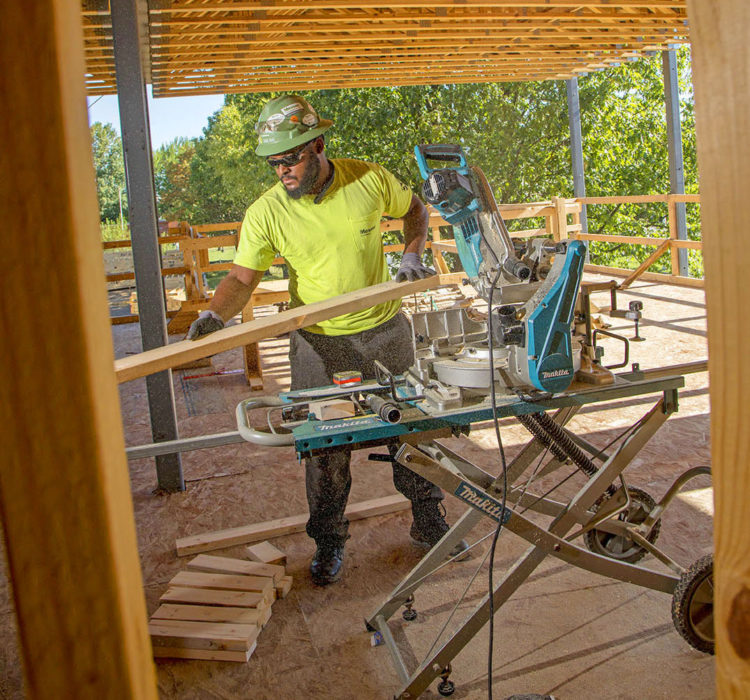
That third rank “means that you’re a master, and you are well-versed in both the interior components, the interior finishes and the exterior of the concrete construction,” Ferguson explained.
“Both Gabriel and Antonye … have been recently promoted to a Level 3 master level. Through the trainings they’re taking and the opportunities they have on site, they are really targeted to being moved into that Level 4 leadership position, probably sooner than most,” he said. At that point, they would begin leading small crews.

Why are these two advancing so quickly? In the case of Israel, Ferguson noted his “drive and determination.” On his own time, Israel studies specialized construction equipment, such as an aerial lift, to give himself an edge in learning to use it.
Ryan Clunie, who supervises Messer’s new hires, pointed out Weathers’ exceptional attention to detail. That helps her with interior work, such as installing fixtures and touching up defects in finishes.
In a way, Weathers and Israel are consumed by the construction techniques they’ve learned. Israel says he can no longer visit a friend’s house, or even look around his own apartment, without seeing workmanship that disappoints him and details he’d like to improve.
Weathers, who is renting to own her home, doesn’t have to imagine making improvements. Her work has also become her new hobby.
“I’ve taken out door frames. I’ve installed walls. I’ve built a closet. I plan on concreting the driveway. I want to fence in my backyard,” she said. “Smaller things I’ve done: I’ve made a doghouse.”

A PROGRAM FOR PROGRAMMERS
Code Louisville, the KentuckianaWorks program that guides students in learning to create software such as web applications, differs in some ways from the construction and manufacturing programs. It was launched in 2013, not to fill demand for workers in an established industry, but to stimulate an emerging sector by training hundreds of people to work in the field.
“After the iPhone came out, and after we started coming out of the recession, every city in the Midwest and Mid-South woke up to the same realization at the same time. All these people are trying to build apps. All these companies are trying to innovate, and they can’t find enough people to do software development,” Gritton said.
Unlike many industrial trades, there’s no national certification for software development or coding — nothing like the certified production technician in manufacturing or the NCCER certification in construction.
“It’s very much a show-me business,” Gritton said. “What Code Louisville has done is teach people how to do software coding and then require them to use their skills to build either websites or backend projects that can be demonstrated to employers. … We have people building portfolios basically—and that becomes their credential.”
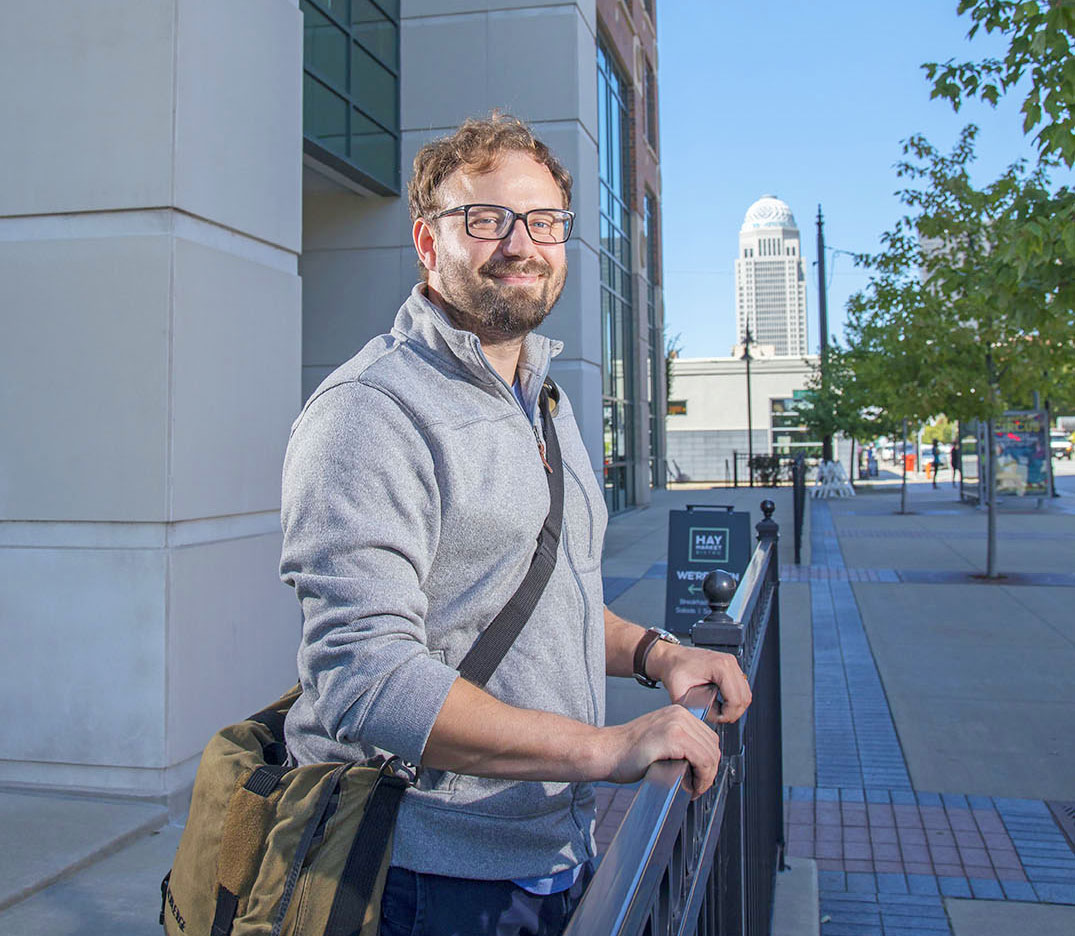
That difference in Code Louisville made all the difference for Jack Perry Jr., 37. He took five separate 12-week Code Louisville courses, exploring five different tracks of instruction. In each course, the bulk of the instruction is individual online study, reinforced with weekly classroom meetings.
When Perry started Code Louisville in January 2018, he was driving a forklift in a grocery warehouse. At the end of his second 12-week session, he landed a full-time job helping develop and maintain a system that tracks the care of residents in assisted-living facilities.
“My hours are much shorter, and I make more money than I did before,” he said. And he enjoys building software much more than stacking pallets.
Before enrolling in Code Louisville, Perry was finishing an associate degree in computer information technology—and looking for a change. He found Code Louisville’s project-based approach, which required him to build a portfolio of work, much more helpful than his associate degree studies.
“Every time I went through and started working on a new project, I would pick up more and more that’s being done in the real world,” Perry said. “It gives me, and I think everybody else, that experience of actually building something that you can demonstrate to somebody else, showcasing what you’ve learned and can do.”
“The beautiful thing is we’ve helped train and place more than 400 people in a very demanding career field,” Gritton said. “Most of those job placements have been with small and midsize companies. … You’re trying to help people be able to jump on a moving train and be able to survive once they do it.”
Code Louisville has just gone through a challenging transition. The grants that kept the program free for more than five years have run out. Now it’s offered through a partnership with Jefferson Community and Technical College, which means students must pay tuition. They’re still signing up.
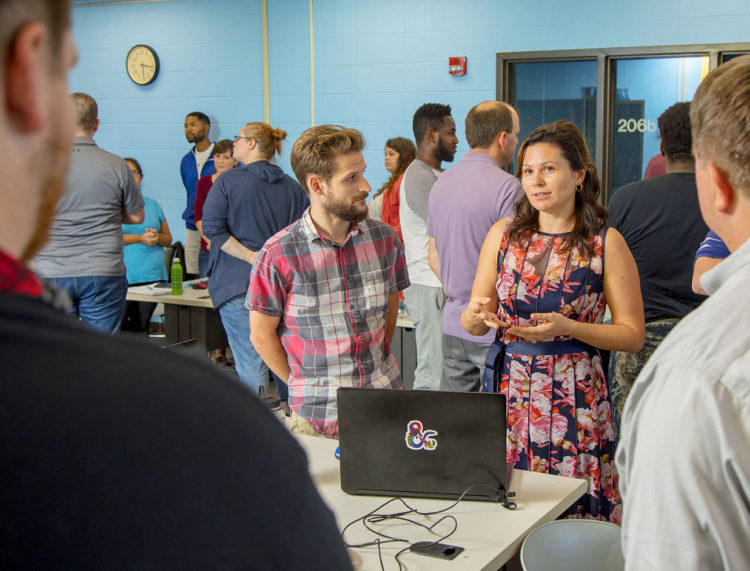
Yana Dubina, 37, came to the United States from Ukraine five years ago. The youngest of her three children is now 3, and she’s looking to broaden her skills and find a job.
In Ukraine, she said, “I had the technical background. I worked as engineer at oil and gas exploration, but not in the field. It’s like in the scientific department.” But she’s found it hard to turn Ukrainian degrees and educational credentials into marketable qualifications in the United States.
Code Louisville is her first venture into American education, and she likes it. “It’s very convenient program, because students can work independently, like with their own time, their own schedule at home, and we need to meet only once per week.”
Although she did some design work with computers in Ukraine, she started Code Louisville from scratch. But because so much of the program is self-paced home study, she thinks she’s keeping up with it.
Jonathon Young, 26, works at Louisville’s Amazon warehouse in preventive maintenance. It’s his job to monitor the condition of conveyors and other machinery and to spot worn components such as belts and bearings. If he does his job right, Amazon can schedule downtime to replace parts instead of being surprised by breakdowns that idle workers and disrupt the flow of merchandise. He likes the work and the attention to detail it requires, but he’s looking to move up. He thinks learning more about programming will help.
Learning coding through Code Louisville is part of a career shift that began after he broke his left ankle on a construction site in 2017.
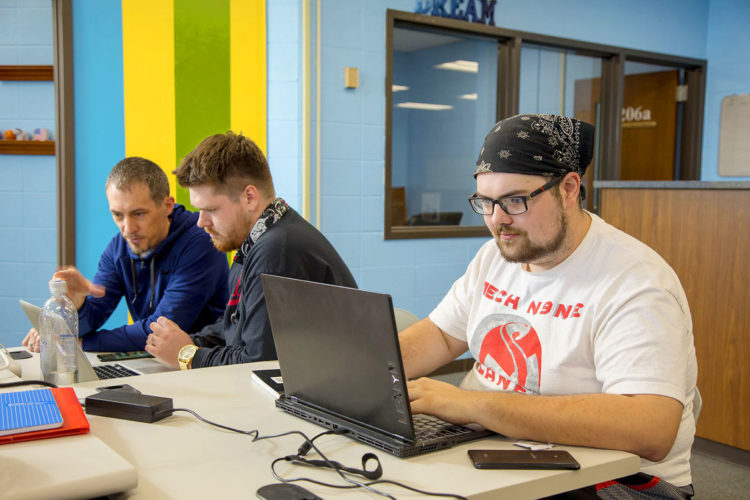
“Once that happened, and I started walking a little less normal, I said, ‘Man, I’ve got to do something.’ Once that spark lit, I took off,” Young said.
He took his first Code Louisville session in August. He thinks the programming language he is learning will be valuable, but the real payoff from his study will be learning to think like a programmer. He calls it “computational thinking.”
He expects that frame of mind to carry him into the future he wants to build for himself. “Once they teach us how to think like a programmer, we can learn and act like a programmer… Once you get that confidence up, where the learning is going to click, it takes off from there,” he said.
And he says the confidence he’s building through Code Louisville is what he needs to build the future he wants.
“Automation is going to be king,” Young said—and he’s all for it. “People are scared of automation. They’re scared of robots taking our jobs. Why? Why? They’re taking the jobs that nobody really wants to do. Who wants to stand in a line and put stuff in a box for 10 hours a day?”
